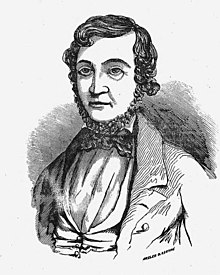Monroe Edwards | |
|---|---|
 A portrait engraving of Edwards from Life and Adventures of the Accomplished Forger and Swindler, Colonel Monroe Edwards, published a year after his death | |
| Born | 1808 Danville, Kentucky, United States |
| Died | January 27, 1847 |
| Nationality | American |
| Occupation | Slave trader |
| Known for | Forgery |
| Criminal charge(s) | Multiple counts of forgery and fraud |
| Criminal penalty | 10 years in prison |
Monroe Edwards (1808 – January 27, 1847) was an American slave trader, forger, and criminal who was the subject of a well-publicized trial and conviction in 1842. Originally from Kentucky, Edwards moved to New Orleans then settled in Texas. He smuggled slaves into Brazil in 1832 and used the proceeds to purchase land in Texas. In 1836, he was again smuggling slaves, this time into Texas. After attempting to swindle his partner out of the profits of the venture, partly with forged documents, Edwards was forced to flee the Republic of Texas to the United States. He then tried to scam money out of various abolitionists in the United States and the United Kingdom, partly with forged letters of introduction. He traveled to the United Kingdom, but his schemes were mainly unsuccessful and he returned to the United States in mid-1841.
Edwards' largest swindle involved forged letters from cotton brokers in New Orleans which he used to secure bank drafts for large sums that he then cashed. His fabrications caught up with him, and he was arrested and tried for the forgeries in June 1842. Convicted partly because his distinctive good looks made him memorable and easily recognizable, and partly from making the same spelling errors in his fakes, Edwards was sentenced to 10 years in prison and died in 1847 while incarcerated. Several sensational accounts of his offenses and trial were published after his death, and he was mentioned in Herman Melville's 1853 short story "Bartleby, the Scrivener".